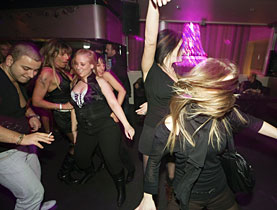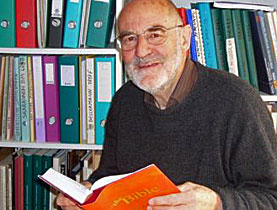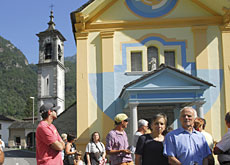Take off your dancing shoes for Easter

Residents in seven Swiss cantons will be required to turn off their music and put away their dancing shoes to respect a ban on dancing on Good Friday and Easter Sunday.
Although Lucerne agreed in March by a single vote to lift a five-century-long ban on dancing on Good Friday, one of the holiest days in the Christian calendar, other mostly German-speaking cantons still maintain it.
Traditions and laws governing leisure activities during religious holidays vary from canton to canton. Cantons Uri, Obwalden, Schaffhausen, Basel Country, Solothurn and Neuchâtel forbid dancing on Good Friday, while Appenzell Inner Rhodes bans it during the whole of Holy Week.
“I’m surprised by canton Neuchâtel, but the other cantons used to be mostly Catholic,” said ethnologist Paul Hugger. “The predominant religion of the time had a huge influence on public life. Regionally, it still carries the weight of its past.”
Elsewhere in the country, canton Zurich partially upholds the dancing ban. Noisy outdoor events (dancing, sports or film showings) are still barred there during the main holidays. Events can take place indoors but with a maximum of 500 people. The same goes for canton Jura.
“A company requesting authorisation to hold a public lottery or dance evening on Good Friday would be turned down due to the current public holiday law,” Boris Rubin, a lawyer at canton Jura’s arts and professions service, told the Swiss news agency.
But Jura clubbers can still dance the night away at private bars and discos.
In canton Neuchâtel the ban applies seven days of the year, including Palm Sunday, Good Friday and Easter Sunday. But a local referendum on May 17 might well overturn things.
The “Tanzverbot”, or ban on dancing, is regulated in German-speaking cantons according to laws relating to leisure time. Cantons say they are not trying to impose Christian beliefs on others but are protecting the right to peace and quiet.
But such legislation raises questions about the importance of holidays for modern society and whether existing laws are relevant or just ancient relics from the past.
Out of touch?
These laws date back to the 18th century, when there was a close relationship between the state and the church, but this has changed owing to the ecumenical mixture of Swiss society, explained Urs Altermatt, professor of history at Fribourg University.
“In various cantons certain Catholic holidays were eliminated, while others were introduced, like May 1,” he told swissinfo. “Such laws no longer reflect reality.”
Hugger agreed: “It’s an old idea that government legislates over leisure time, but it’s disappearing more and more in today’s individual, universal society.”
The bigger question is how we can find common days off for a modern pluralist society like Switzerland, which is a mosaic of cultures and religions, said Altermatt.
For Giuseppe Gracia, spokesman for the Basel diocese, “good laws reflect a desirable arrangement of society and individuality”.
“There is a time for partying, dancing and exuberance,” he said. “But there is also a time for peace and inner reflection. Both belong to human nature and to the message of the Catholic Church.”
“Laws, though, belong to the state,” said Gracia.
For Gracia the laws are only problematic when they miss the mark.
“If they allow people to celebrate all the time, be active and loud without any sense for calm and self-discovery. But also if they begin to forbid celebration and demonise any fun, which are also only very human.”
swissinfo, Simon Bradley with agencies
In Europe bans on dancing go back hundreds, if not thousands, of years.
Links between dancing and evil forces were established in early human history. Magicians and sorcerers used to dance wearing masks representing animals or monsters.
The uplifting, ecstatic side of dancing was later denounced. In 1BC the Roman philosopher and statesman Cicero wrote: “Almost no one dances while they are fasting”.
The Christian church later condemned the social aspect of dancing. In 4AD Saint Augustin, critical of music’s seductive capability, wrote: “dancing is a circle with the devil at its very centre”.
Around 800AD Charlemagne, the King of the Franks, even proclaimed a general ban on dancing. But his people couldn’t resist the urge to tap their toes and so revolted, with dancing becoming a highly appreciated activity throughout society.
Cantons Geneva and Bern introduced a ban in 1539 and 1573, respectively. As Catholic regions were slightly more tolerant over the issue, Protestant fans of the waltz, tango, samba and others travelled to neighbouring cantons to let their hair down.

In compliance with the JTI standards
More: SWI swissinfo.ch certified by the Journalism Trust Initiative












You can find an overview of ongoing debates with our journalists here . Please join us!
If you want to start a conversation about a topic raised in this article or want to report factual errors, email us at english@swissinfo.ch.